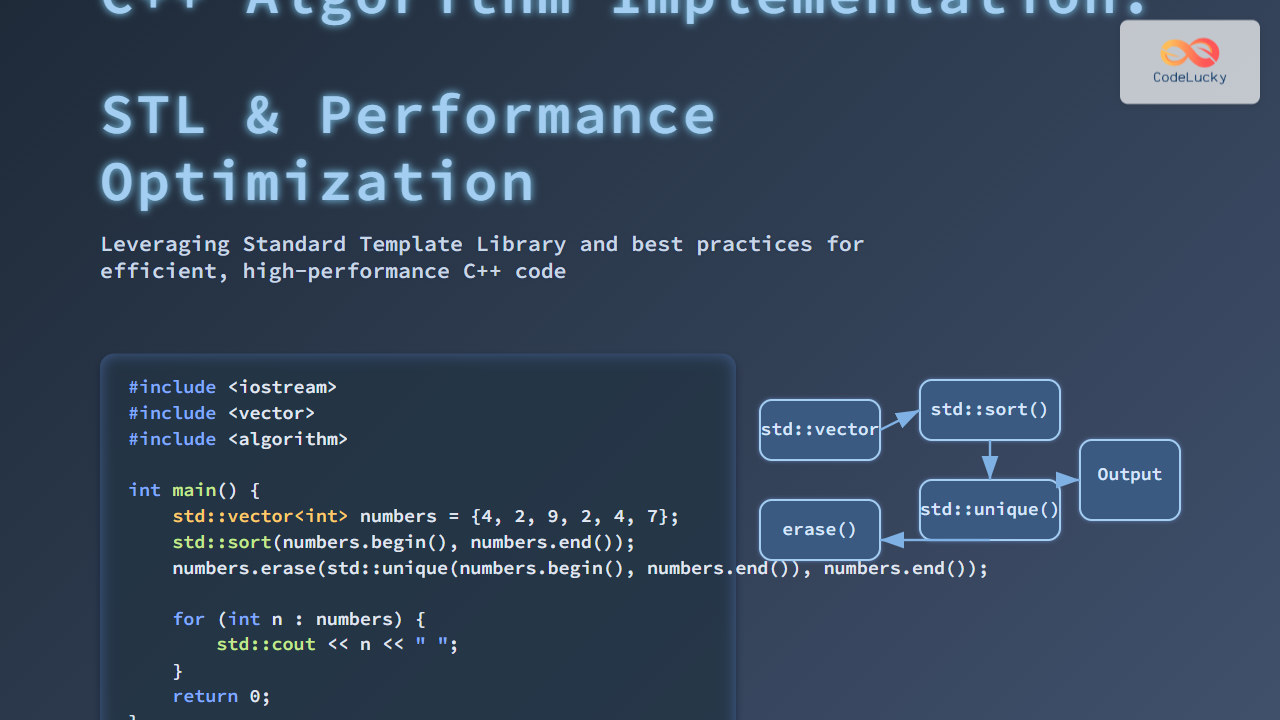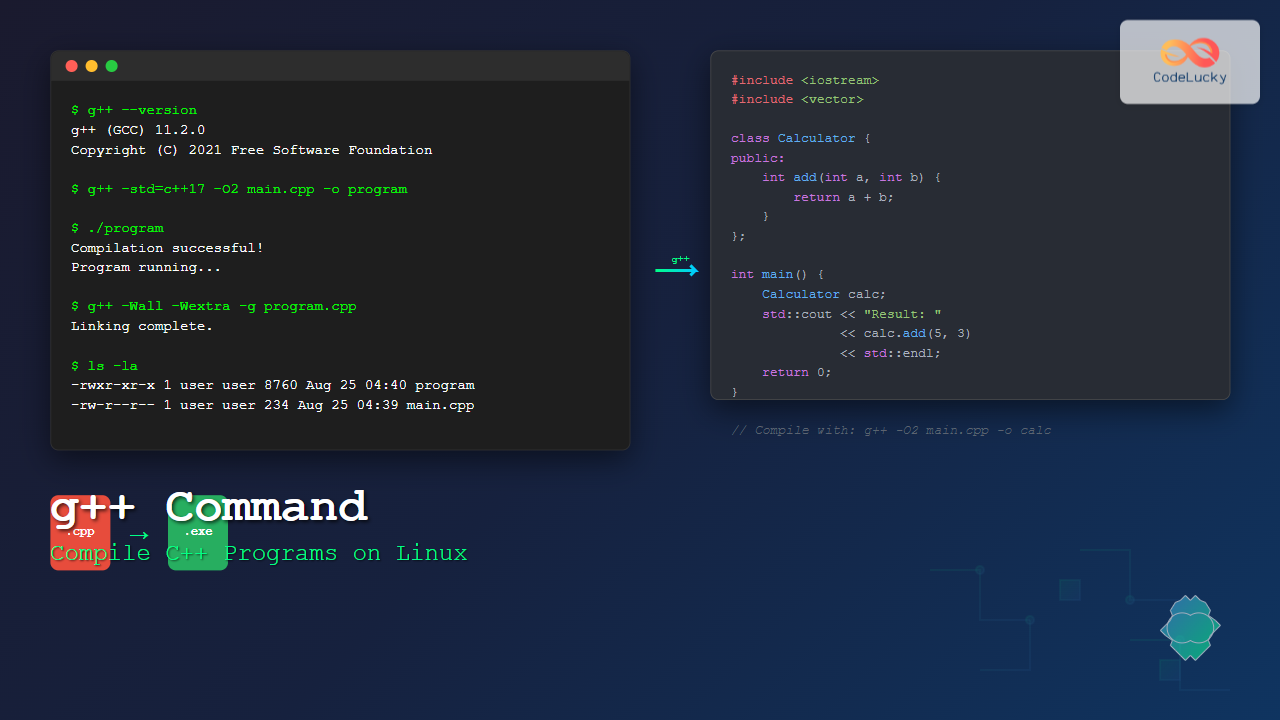In the world of C++, the std::map container is a powerful tool for managing key-value pairs. It's an associative container that stores elements formed by a combination of a key value and a mapped value, following a specific order. Today, we'll dive deep into the various methods available for manipulating and accessing data in C++ maps.
Understanding the Basics of C++ Maps
Before we delve into the methods, let's quickly recap what a map is in C++. A map is a sorted associative container that contains key-value pairs with unique keys. Keys are used to sort and uniquely identify the elements, while values store the content associated with the keys.
Here's a simple example to illustrate a map:
#include <iostream>
#include <map>
#include <string>
int main() {
std::map<std::string, int> age_map;
age_map["Alice"] = 30;
age_map["Bob"] = 25;
age_map["Charlie"] = 35;
for (const auto& pair : age_map) {
std::cout << pair.first << " is " << pair.second << " years old." << std::endl;
}
return 0;
}
Output:
Alice is 30 years old.
Bob is 25 years old.
Charlie is 35 years old.
Now that we have a basic understanding, let's explore the various methods available for C++ maps.
1. Insertion Methods
1.1 insert()
The insert() method is used to insert elements into a map. It has several overloads:
#include <iostream>
#include <map>
int main() {
std::map<int, std::string> m;
// Insert a single element
m.insert(std::pair<int, std::string>(1, "One"));
// Insert using make_pair
m.insert(std::make_pair(2, "Two"));
// Insert using initializer list
m.insert({3, "Three"});
// Insert with hint
auto it = m.begin();
m.insert(it, std::pair<int, std::string>(4, "Four"));
// Print the map
for (const auto& pair : m) {
std::cout << pair.first << ": " << pair.second << std::endl;
}
return 0;
}
Output:
1: One
2: Two
3: Three
4: Four
💡 Pro Tip: The insert() method returns a pair, where the first element is an iterator to the inserted element (or to the element that prevented the insertion), and the second is a boolean indicating whether the insertion took place.
1.2 emplace()
The emplace() method constructs the element in-place, potentially avoiding the extra copy or move operation that insert() might require.
#include <iostream>
#include <map>
#include <string>
int main() {
std::map<int, std::string> m;
// Using emplace
auto result = m.emplace(1, "One");
std::cout << "Inserted: " << result.second << std::endl;
// Trying to emplace an existing key
result = m.emplace(1, "Uno");
std::cout << "Inserted: " << result.second << std::endl;
// Print the map
for (const auto& pair : m) {
std::cout << pair.first << ": " << pair.second << std::endl;
}
return 0;
}
Output:
Inserted: 1
Inserted: 0
1: One
🔑 Key Point: emplace() is often more efficient than insert() when you need to construct the element in-place.
2. Access Methods
2.1 operator[]
The subscript operator [] provides a simple way to access or insert elements.
#include <iostream>
#include <map>
#include <string>
int main() {
std::map<std::string, int> scores;
// Inserting elements
scores["Alice"] = 95;
scores["Bob"] = 80;
// Accessing elements
std::cout << "Alice's score: " << scores["Alice"] << std::endl;
// Modifying elements
scores["Bob"] += 5;
std::cout << "Bob's updated score: " << scores["Bob"] << std::endl;
// Accessing a non-existent key creates a new element
std::cout << "Charlie's score: " << scores["Charlie"] << std::endl;
// Print all scores
for (const auto& pair : scores) {
std::cout << pair.first << ": " << pair.second << std::endl;
}
return 0;
}
Output:
Alice's score: 95
Bob's updated score: 85
Charlie's score: 0
Alice: 95
Bob: 85
Charlie: 0
⚠️ Warning: Using operator[] with a non-existent key will create a new element with a default-constructed value.
2.2 at()
The at() method provides checked access to map elements.
#include <iostream>
#include <map>
#include <string>
int main() {
std::map<std::string, int> ages;
ages["Alice"] = 30;
ages["Bob"] = 25;
try {
std::cout << "Alice's age: " << ages.at("Alice") << std::endl;
std::cout << "Charlie's age: " << ages.at("Charlie") << std::endl;
} catch (const std::out_of_range& e) {
std::cout << "Exception: " << e.what() << std::endl;
}
return 0;
}
Output:
Alice's age: 30
Exception: map::at
🛡️ Safety First: Unlike operator[], at() throws an std::out_of_range exception if the key doesn't exist, making it safer for scenarios where you want to ensure the key exists.
3. Removal Methods
3.1 erase()
The erase() method removes elements from the map.
#include <iostream>
#include <map>
#include <string>
int main() {
std::map<char, int> char_map;
char_map['a'] = 1;
char_map['b'] = 2;
char_map['c'] = 3;
char_map['d'] = 4;
// Erase by key
char_map.erase('b');
// Erase by iterator
auto it = char_map.find('c');
if (it != char_map.end()) {
char_map.erase(it);
}
// Erase a range
auto start = char_map.find('a');
auto end = char_map.find('d');
if (start != char_map.end() && end != char_map.end()) {
char_map.erase(start, end);
}
// Print remaining elements
for (const auto& pair : char_map) {
std::cout << pair.first << ": " << pair.second << std::endl;
}
return 0;
}
Output:
d: 4
🗑️ Cleanup Tip: erase() is versatile, allowing you to remove elements by key, iterator, or range.
3.2 clear()
The clear() method removes all elements from the map.
#include <iostream>
#include <map>
int main() {
std::map<int, std::string> num_map;
num_map[1] = "One";
num_map[2] = "Two";
num_map[3] = "Three";
std::cout << "Size before clear: " << num_map.size() << std::endl;
num_map.clear();
std::cout << "Size after clear: " << num_map.size() << std::endl;
return 0;
}
Output:
Size before clear: 3
Size after clear: 0
🧹 Clean Slate: Use clear() when you need to reset your map to an empty state quickly.
4. Search and Capacity Methods
4.1 find()
The find() method searches for an element with a specific key.
#include <iostream>
#include <map>
#include <string>
int main() {
std::map<std::string, int> fruit_prices;
fruit_prices["apple"] = 100;
fruit_prices["banana"] = 80;
fruit_prices["cherry"] = 150;
std::string fruit = "banana";
auto it = fruit_prices.find(fruit);
if (it != fruit_prices.end()) {
std::cout << fruit << " costs " << it->second << " cents." << std::endl;
} else {
std::cout << fruit << " not found in the price list." << std::endl;
}
fruit = "grape";
it = fruit_prices.find(fruit);
if (it != fruit_prices.end()) {
std::cout << fruit << " costs " << it->second << " cents." << std::endl;
} else {
std::cout << fruit << " not found in the price list." << std::endl;
}
return 0;
}
Output:
banana costs 80 cents.
grape not found in the price list.
🔍 Search Tip: find() returns an iterator to the element if found, or end() if not found.
4.2 count()
The count() method returns the number of elements with a specific key.
#include <iostream>
#include <map>
#include <string>
int main() {
std::map<std::string, int> word_count;
word_count["hello"] = 5;
word_count["world"] = 3;
word_count["cpp"] = 2;
std::string word = "hello";
std::cout << "Count of '" << word << "': " << word_count.count(word) << std::endl;
word = "map";
std::cout << "Count of '" << word << "': " << word_count.count(word) << std::endl;
return 0;
}
Output:
Count of 'hello': 1
Count of 'map': 0
📊 Count Insight: For std::map, count() will always return either 0 or 1, as keys are unique.
4.3 size() and empty()
These methods provide information about the map's current state.
#include <iostream>
#include <map>
int main() {
std::map<char, int> char_map;
std::cout << "Is map empty? " << (char_map.empty() ? "Yes" : "No") << std::endl;
std::cout << "Map size: " << char_map.size() << std::endl;
char_map['a'] = 1;
char_map['b'] = 2;
std::cout << "Is map empty now? " << (char_map.empty() ? "Yes" : "No") << std::endl;
std::cout << "Map size now: " << char_map.size() << std::endl;
return 0;
}
Output:
Is map empty? Yes
Map size: 0
Is map empty now? No
Map size now: 2
📏 Measure Up: Use size() to get the number of elements and empty() to quickly check if the map has any elements.
5. Iterator Methods
5.1 begin() and end()
These methods return iterators to the beginning and end of the map.
#include <iostream>
#include <map>
#include <string>
int main() {
std::map<int, std::string> num_map;
num_map[1] = "One";
num_map[2] = "Two";
num_map[3] = "Three";
std::cout << "Forward iteration:" << std::endl;
for (auto it = num_map.begin(); it != num_map.end(); ++it) {
std::cout << it->first << ": " << it->second << std::endl;
}
std::cout << "\nReverse iteration:" << std::endl;
for (auto it = num_map.rbegin(); it != num_map.rend(); ++it) {
std::cout << it->first << ": " << it->second << std::endl;
}
return 0;
}
Output:
Forward iteration:
1: One
2: Two
3: Three
Reverse iteration:
3: Three
2: Two
1: One
🔄 Iterator Insight: Use rbegin() and rend() for reverse iteration.
6. Comparison Methods
6.1 key_comp() and value_comp()
These methods return the comparison objects used by the map.
#include <iostream>
#include <map>
#include <string>
int main() {
std::map<int, std::string> num_map;
num_map[1] = "One";
num_map[2] = "Two";
num_map[3] = "Three";
auto key_compare = num_map.key_comp();
auto value_compare = num_map.value_comp();
std::cout << "Comparing keys 2 and 3: " << key_compare(2, 3) << std::endl;
std::cout << "Comparing keys 3 and 2: " << key_compare(3, 2) << std::endl;
auto pair1 = std::make_pair(2, "Two");
auto pair2 = std::make_pair(3, "Three");
std::cout << "Comparing pairs (2,Two) and (3,Three): " << value_compare(pair1, pair2) << std::endl;
std::cout << "Comparing pairs (3,Three) and (2,Two): " << value_compare(pair2, pair1) << std::endl;
return 0;
}
Output:
Comparing keys 2 and 3: 1
Comparing keys 3 and 2: 0
Comparing pairs (2,Two) and (3,Three): 1
Comparing pairs (3,Three) and (2,Two): 0
📊 Compare Note: These methods are useful when you need to use the map's comparison logic elsewhere in your code.
Conclusion
C++ maps are versatile containers that offer a wide range of methods for efficient key-value pair operations. From insertion and access to removal and searching, these methods provide powerful tools for managing your data. By mastering these methods, you'll be able to write more efficient and effective C++ code when working with associative containers.
Remember, the choice of method often depends on your specific use case. For instance, use at() when you want to ensure the key exists, operator[] when you want to insert or modify elements easily, and find() when you just need to check for existence without modifying the map.
As you continue your C++ journey, experiment with these methods in different scenarios to fully grasp their potential and limitations. Happy coding! 🚀👨💻👩💻

















